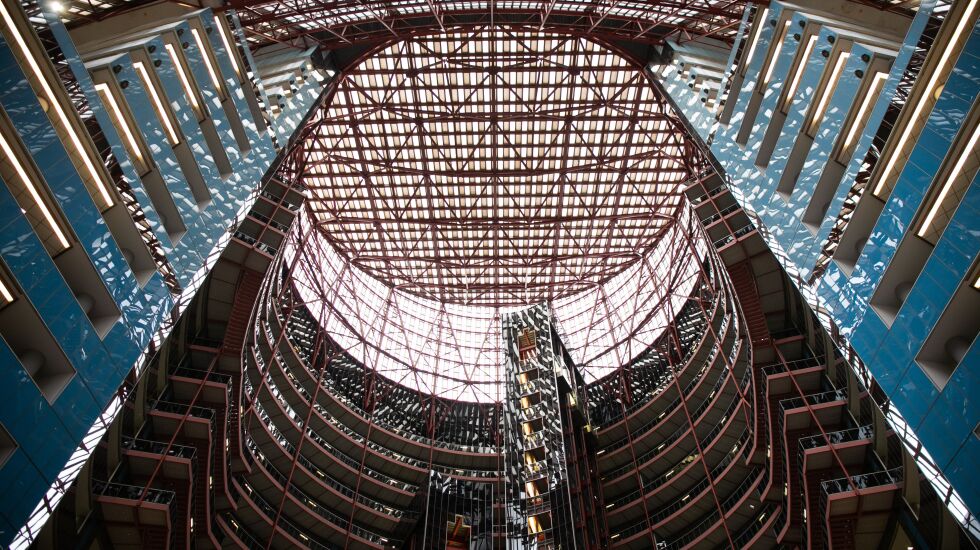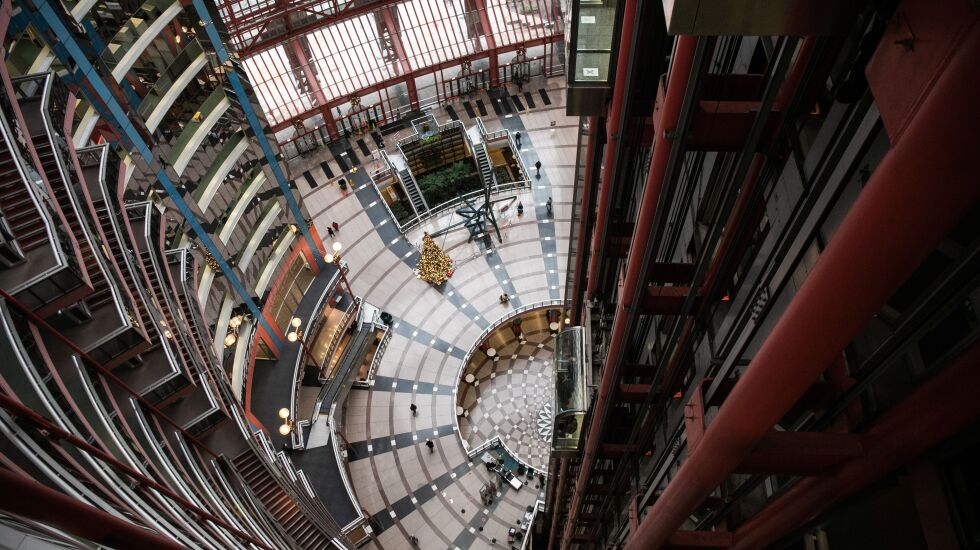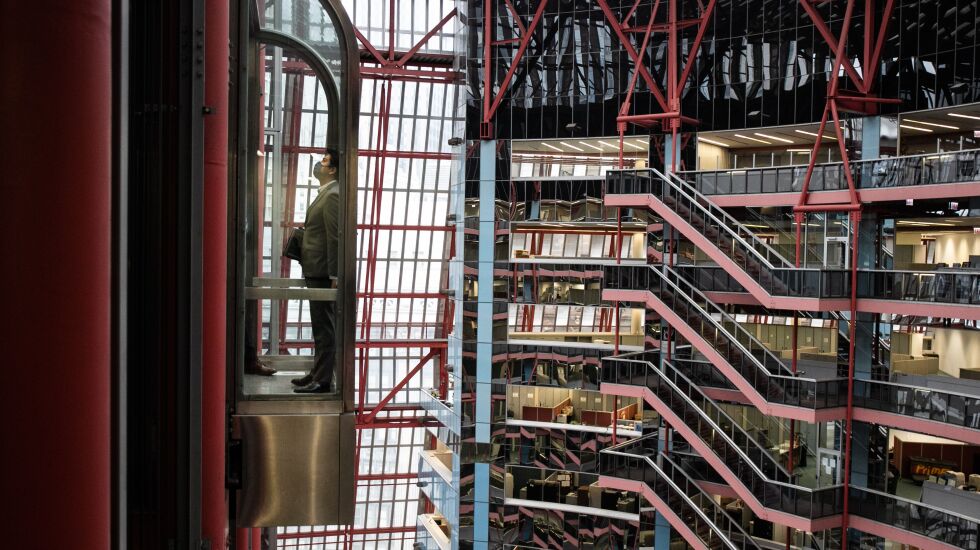
Gov. J.B. Pritzker consulted Google and decided to search no further in a quest to rid the state of a financial drag that is the Thompson Center. In a reboot of plans to save the state’s former Chicago office hub, he said Google will buy the building in a deal that benefits taxpayers and the downtown office market.
The search engine giant, with 2,000 employees in Chicago, will occupy the entire building. The state, working out terms with developer Michael Reschke, will sell it to Google for $105 million.
In turn, the state will pay $75 million for the 115 S. LaSalle St. building, formerly the BMO Harris Bank building. Reschke, CEO of the firm Prime Group, will manage a renovation of the Thompson Center for Google.
“The state will own 50% more space on LaSalle Street at 50% less cost,” Reschke said.
Pritzker said the deal will save the state money on office leases, certify Chicago’s appeal to the tech community and revitalize a section of downtown. The new agreement replaces plans announced in December for Reschke to buy most of the Thompson Center, 100 W. Randolph St., with the state retaining some space there.
Addressing Google executives at a news conference Wednesday, Pritzker said, “Google is one of Chicago’s most important companies. You are an integral part of our community and you have invested in your future while investing in ours.” The governor said the agreement will allow the state to consolidate space downtown it currently leases, saving $1 billion over the next 30 years.
Karen Sauder, head of Google’s Chicago operations, said, “The way we see it, the Thompson Center is more than just a building. Establishing a presence here in the Loop allows us to get in on the ground floor of revitalizing and breathing new life into the very heart of this city.
“Just as we’re proud of the role we played in turning Fulton Market into one of the most vibrant and energetic neighborhoods in the city, we have the opportunity to do it all over again here.”
In December, Reschke released conceptual renderings for how the Thompson Center might look. A Google spokesman said new designs are now in the works. Sauder said the company would work with others to “thoughtfully update this building to our high sustainability standards while respecting its iconic design.”
Google kicked off the corporate march into an old meatpacking and industrial district west of the Loop when it occupied a gut-rehabbed former cold storage facility at 1000 W. Fulton Market in 2015. Other companies followed, as did hotels and apartment buildings.
State officials said $30 million from the Thompson Center sale will be in upfront cash. In acquiring 115 S. LaSalle, the state will own the westernmost tower of a three-building complex. The other two buildings use the address of 111 W. Monroe St. and will continue to be owned by a partnership of Reschke and Quintin Primo III, chairman of Capri Investment Group.
The 37-story 115 S. LaSalle building contains almost 592,000 usable square feet, state officials said. They said about 1,800 employees working at the Thompson Center and leased offices downtown will be moved there. The state already has centralized about 2,000 workers in a building it owns at 555 W. Monroe St.

While the state will be responsible for renovating its new home, officials said the cost will be much less than the $148 million projected as its share of the work needed to modernize the Thompson Center, which opened in 1985 but suffered from the state’s neglect as the building aged.
The glass-enclosed design by the late architect Helmut Jahn and championed by the late Gov. James Thompson has long brought varied reactions. Some people hail it as a progressive approach to a government building, and others deem it dated and a waste of space. Cost-cutting moves during construction, experts say, resulted in a building that overheated even in the winter. State officials have said it costs $17 million a year just to operate the building.
Reschke has said one of his main objectives is to replace the glass curtain wall and the heating and air conditioning systems.
At Wednesday’s announcement, Reschke said, “We fell in love with this iconic treasure that Helmut Jahn and Governor Thompson built almost 40 years ago. The building is unique and irreplaceable.” He said the atrium, soaring for 17 stories, has as much space as a basketball arena.
The building contains 1.2 million square feet, and while Google is taking over its entirety, it’s unclear what the company will do with its other office space in Chicago. “Our occupancy plans across Fulton Market and the Loop will be decided down the road so that it aligns with specific team and business needs at that time,” a spokesman said. He said Google expects to occupy the Thompson Center in 2026.

Google leases about 500,000 square feet between the former cold storage warehouse, now marketed as 1K Fulton, and offices nearby at 210 N. Carpenter St.
Sauder said one of the Thompson Center’s attributes is that it is a stop for six CTA transit lines, simplifying access for workers from anywhere in the city. Officials said the renovation can proceed without interrupting train service.
Google’s plans here come even as the company has said it plans to slow down hiring. Google is the best-known unit of the company Alphabet, which Tuesday reported its slowest growth since the onset of the pandemic. The company said advertisers, the main source of Alphabet revenue, are scaling back in expectation of a recession.
The company is still highly profitable, earning $16 billion during this year’s second quarter.
Just as Google pioneered the push into Fulton Market, downtown boosters hope its new commitment in the Loop will help an office market struggling with vacancy. Corporate users are downsizing to cut expenses as more employees work from home at least part of the time. The city also took a hit to its reputation when the hedge fund Citadel said it was pulling up stakes here and heading off to Miami. Founder Ken Griffin cited rising crime in Chicago as his prime reason for moving.
Reschke said Google’s move alone will cut the vacancy rate in the central Loop from 22% to 16%, a rate that he said beats national averages.
Mayor Lori Lightfoot also heaped praise on Google, saying its investment promises to be the biggest corporate jobs infusion downtown in 10 years. “This is a milestone in Chicago history,” she said.
Lightfoot said Chicago holds many attractions for the tech sector’s younger workforce, including a track record of innovation and relatively low cost of living. “The coasts have nothing on us,” she said.







